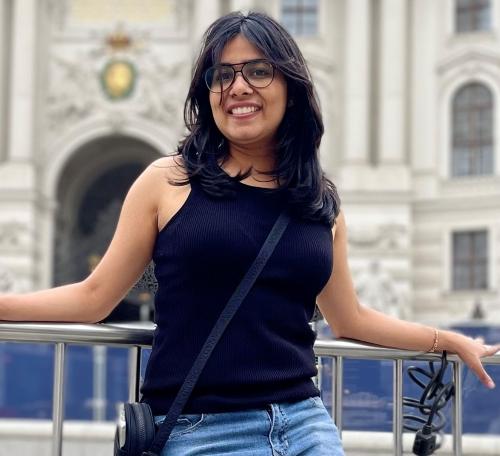You are here :
- EUTOPIA website
- Home
- Research & Innovation
- Fellowship
- SIF - Post-Doctoral Fellowships
SIF 3rd Cohort Fellows - Bajaj Ashima, Vrije Universiteit Brussel

Curriculum Vitae
- Education
2018-2022: PhD in Theoretical and Computational Chemistry; Institute of Nano Science and Technology, IISER Mohali, India.
2014-2016: M.Sc in Physics, Panjab University, Chandigarh, India.
2011-2014: B.Sc in Physics, Panjab University, Chandigarh, India.
- Experience
February 2023 – September 2023 - Postdoctoral Researcher, University at Buffalo, The State University of New York, US.
Recently, as a postdoctoral fellow, I have focused on the understanding of the chemistry of rare earth elements, where I worked with Prof. Jochen Autschbach to characterize the magnetic, optical and spectroscopic properties of various lanthanide and actinide complexes using a genre of DFT and multireference methods.
While, at INST Mohali, where I finished my PhD with Prof. Md. Ehesan Ali, I primarily studied the magnetic and spin polarized quantum transport properties of organic radicals in a single molecule junction environment for spintronic applications using NEGF-DFT based theoretical approaches.
Throughout my research career with Masters in Physics to a Postdoc in Computational Chemistry, I have endorsed an interdisciplinary alliance between physics and chemistry and contributed in the form of > 10 publications and >10 international conferences with poster and oral presentations. I have been the recipient of several poster prizes (Theoretical Chemistry Symposium, SIMs, India) as well as DST international travel grant.
- Social media presence/Research achievements
Research Gate
ORCID
Research Project:
Boosting automated reaction mechanism discovery using quantum chemical reactivity descriptors
One of the most powerful applications of computational chemistry lies in identifying and characterizing chemical reaction mechanisms; calculations of reaction thermodynamics, activation barriers and reactive molecular motion give fundamental insights into new modes of chemical reactivity, for example, opening up the development of more efficient, more sustainable catalysts or identifying new synthetic routes to lower the cost of pharmaceuticals.
However, in cases where reaction mechanisms are either not clear or completely unknown, the challenge of developing computational reactivity models increases significantly. For example, the formation of complex organic molecules in the interstellar medium is not well understood at all, with the complex interplay of radical chemistry, UV-driven reactivity, and ice-grain surfaces offering formidable challenges. Also, in the ongoing drive to seek out greener and more sustainable chemical synthesis routes, multi-component and one-pot reactions are emerging as an important frontier for exploration; yet the challenge of identifying and controlling different chemical reactivity modes in such complex systems clearly demands new ideas.
In this project, a new computational strategy for automatically identifying the most plausible reaction mechanism(s) operating in complex chemical reaction environments containing multiple reactive species or catalysts will be developed, verified, and applied; this will be realized through a combination of conceptual quantum chemistry reactivity descriptors, machine learning and inverse design.
The primary host of this project is ALGC Research Group at Vrije Universiteit Brussel (VUB), Belgium, and the co-host is University of Warwick, UK. An extension of collaboration and external secondment plan has been reached out to PSL University, Paris.


